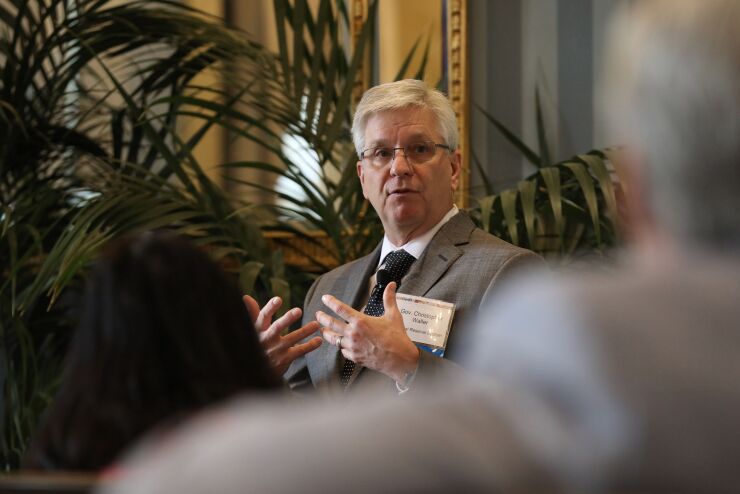Feds Waller: Innovations in the crypto sector should not be stifled

Bloomberg
Federal Reserve Board Governor Christopher Waller is not a personal fan of cryptocurrency, but he sees value in the underlying technology for traditional finance, he said Friday at a conference on digital money, decentralized finance and cryptocurrencies in La Jolla, California.
In his prepared remarks, he said digital assets and their supporting technologies pose many unique challenges and risks to banks, but warned against ignoring them completely.
“While it is critical that we ensure that the risks to financial stability associated with cryptoassets are mitigated, it is important that we keep the different parts of the cryptoecosystem distinct in our minds as the debate about whether and how to regulate crypto continues,” said Waller at the event, which was hosted by the Global Interdependence Center, a Philadelphia-based nonprofit organization. “Doing so will ensure that we do not unduly limit the development and potential future use of the positive features of the crypto ecosystem.”
Waller expressed no opinion on the regulatory treatment of cryptoassets, but his view of their potential benefits is rosy in banking supervisory circles. In recent public comments, Fed Deputy Chairman for Supervision Michael Barr and Fed Governor Lisa Cook both have described crypto as an area that should have limited engagement with traditional banking.
Other regulators, including the Securities and Exchange Commission, have gone as far as to adopt specific rules around crypto assets. In late January, the White House issued a “roadmap for mitigating crypto risk“, which encouraged agencies to move forward.
Waller said in his speech that he has not invested in cryptocurrency, but he has no problem with others “playing” in the space, as long as they are aware of the risks involved, namely that the value of the assets could drop to zero. He added that those running the space should not expect “the taxpayers to socialize [their] loss.”
People have long given value to objects that are intrinsically worthless, Waller said, citing research by economist Paul Sameulson on “the social contrivance of money” dating back to 1958. In this sense, he said, cryptocurrency presents nothing “fundamentally new or interesting”. .”
However, Waller cited several elements of the digital asset market that he sees becoming valuable to traditional finance, including distributed ledgers — commonly known as blockchain — as well as tokenization and smart contracts.
“This technology has an amazing ability to do things and do them well and do them better [than current market tools]”, he said during the Q&A portion of the event. “That’s what you’re going to see coming more and more into centralized finance. Crypto assets may never get there, but the technology will survive and move forward.”
Waller said the world of cryptocurrencies has already come a long way from its decentralized origins, noting that while the technology was originally intended to be a strictly peer-to-peer trading market, it has been mediated by exchanges and other entities that have proliferated. in the room in recent years. In this sense, he said, the technology is becoming more and more similar to traditional finance, in that it is now centered on trust in intermediaries.
Pointing at failed crypto exchange FTX and othersWaller said many intermediaries in the space have proven unsuited to interacting with the traditional financial system, but he expects that to change as best practices around corporate governance, risk management and transparency come to the fore.
“They will grow, they will mature, they will get there, and when that happens, there will be a lot more opportunity to think about interfacing crypto into the traditional financial sector,” he said.
Last month, the Fed, the Office of the Comptroller of the Currency and the Federal Deposit Insurance Corp. issued a joint statement that the banks had to meet a high bar to prove that they could handle digital assets in a safe and sound manner.
Waller echoed this sentiment, saying that the speculative nature of cryptocurrencies means they should be kept off bank balance sheets.
“We don’t let banks go into collectibles, we don’t let them keep art, we don’t let them keep all these speculative things where the price goes to zero. Limited edition sneakers. We don’t want banks going into things like that,” said he. “That’s what you have to realize about these cryptoassets: there’s an equilibrium where the value is positive and an equilibrium where it goes to zero. It’s an incredibly risky asset. We don’t allow banks to do that with other things that have these kinds of characteristics . So if you’re going to let crypto in, it needs to be monitored very carefully.”
Still, while the crypto sector itself is risky, Waller said, the potential innovations within it are worth protecting.
“The question is, does this technology in the cryptosystem have a value proposition outside the cryptoecosystem?” Waller said. “My view is let’s find out. It may and it may not, so let’s try it and see where it goes.”


